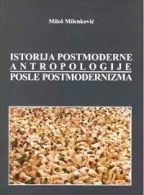Istorija postmoderne antropologije
History of the Postmodern Anthropology
After Postmodernism
Author(s): Miloš Milenković
Subject(s): Anthropology, Social Sciences, Sociology, Cultural Anthropology / Ethnology, Culture and social structure , Methodology and research technology
Published by: Srpski genealoški centar
Summary/Abstract: After reassessing "what was postmodern after all" in anthropology, the analysis aims at repositioning the debate into a relatively coherent change in a view of what (social) science is. My main purpose is to demonstrate how anthropology should or has already changed its objects, theories and methods conforming itself to interdisciplinary and multicultural politics of knowledge. In a separate study I suggest that reflexivity in anthropology can be viewed as a coordinative definition that helped anthropology survive its three crises – the crisis of ethnographic representation, the crisis of scientific realism, and the crisis of anthropological authority. In addition, reflexivity, in a specific sense, can be taken as a substitute for experiment, a subsititute even better than comparative studies, and can thus help fulfill the long dream of consolidating anthropology on firm scientific grounds (a dream I believe is, though, no longer necessary). This text should be understood as a part of a series of studies that strive towards the methodological formalization of supposedly formalization-resistant concepts of postmodern anthropology. In reality, reflexive anthropology became postmodern science only by admitting to be experimental art, but the question is who would understand and, more importantly, finance and apply this concept? The incorporation of reflexivity into the core of anthropology enabled it to finally achieve the status of science, in the most conservative and general methodological sense. Therefore, the anti-postmodern frustration present in some relatively recent debates is neither methodologically nor pragmatically founded. Reflexivity can only be useful, not harmful to the discipline, even from the standpoint of traditional, problem-applicative concepts of method. The only remaining assignment is to reformulate it so it could be applied by methodological traditionalists as well. As much of the debate driven by the postmodern critique may well be reduced to the problem of whether there is any relevant epistemic difference between theoretical and observational assertions, my purpose is to suggest that it corresponds with "the entity realism debate" in philosophy of science. Concluding chapter aims at repositioning "the writing culture debate" into the "writing political subjects" debate, and at reaffirming its relevance both for research and acceleration of broader social, political, scientific and educational changes in contemporary Serbia.
- Page Count: 184
- Publication Year: 2007
- Language: Serbian
- eBook-PDF
- Sample-PDF
- Table of Content

